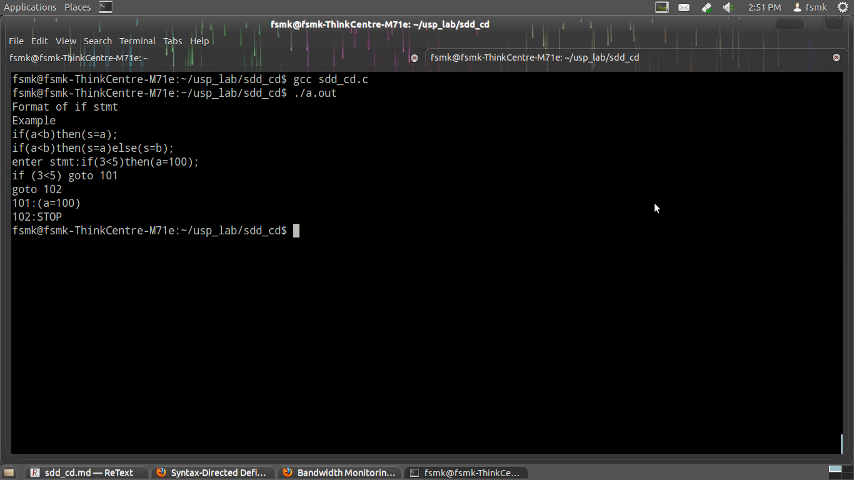Aim:
Write a C program for a syntax directed definition of a "if E then S1" and "if E then S1 else S2"
Description:
A SYNTAX-DIRECTED DEFINITION is a context-free grammar in which each grammar symbol X is associated with two finite sets of values: the synthesized attributes of X and the inherited attributes of X, each production A -> alpha is associated with a finite set of expressions of the form
b : = f (c1,..., ck)
called semantic rules where f is a function and either b is a synthesized attribute of A and the values c1,..., ck are attributes of the grammar symbols of alpha or A, or b is an inherited attribute of a grammar symbol of alpha and the values c1,..., ck are attributes of the grammar symbols of alpha or A. Each terminal symbol has no inherited attributes.
It is usual to denote the attributes of a grammar symbol in the form X.name where name is an meaningful name for the attribute.
Algorithm:
- Start
- Output the if, if-else statement to the user for reference.
- Manipulate the input string such that the if and if-else conditions are stored separately.
- Generate the format of the if, if-else statements and output the same.
- End.
Code:
#include<stdio.h>
#include<stdlib.h>
#include<string.h>
char input[60],stmt[3][60];
int len,cur,i,j;
void gen()/*used for generation of if, if-else format statements*/
{
int l1=101,l2=102,l3=103;
printf("if %s goto %d\n",stmt[0],l1);
printf("goto %d\n",l2);
printf("%d:%s\n",l1,stmt[1]);
if(cur<3)/*if statement*/
printf("%d:STOP\n",l2);
else/*if-else statement*/
{
printf("goto %d\n",l3);
printf("%d:%s\n",l2,stmt[2]);
printf("%d:STOP\n",l3);
}
}
int main()
{
printf("Format of if stmt\nExample\n");
printf("if(a<b)then(s=a);\n");
printf("if(a<b)then(s=a)else(s=b);\n");
printf("enter stmt:");
gets(input);
len=strlen(input);
int index=0;
for(i=0;i<len&&input[i]!=';';i++)
if(input[i]=='(')
{
index=0;
for(j=i;input[j-1]!=')';j++)
stmt[cur][index++]=input[j];
cur++;
i=j;
}
gen();
return 0;
}
Output:
Commands for execution:-
- Open a terminal
- Change the directory to the file location
- Use gcc filename.c for compilation
- Run ./a.out for execution
Screenshots:-
